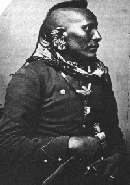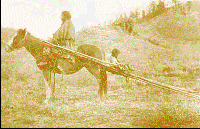
"Oh, Eagle, come with wings outspread in sunny skies. Oh, Eagle,
come and bring us peace, thy gentle peace. Oh, Eagle, come and
give new life to us who pray."
"Remember the circle of the sky, the stars, and the brown eagle,
the great life of the Sun, the young within the nest.
Remember the sacredness of things.
Pawnee Prayer
Stories
Making the Sacred Bundle
Prisoners of Court House Rock

The Pawnee Indians of North America possess one of the
oldest native American cultures of the Great Plains.
Sometime after about AD 1200 these Caddoan speakers
entered the plains from east of the Mississippi River and
settled near the Platte River in present-day Nebraska.
From the beginning they grew corn, beans, pumpkins, and
fruit, and they harvested a perennial plant of grassy cereal-like
grain found in wet or swampy areas, called "wild oats" by the
French, and similar to wild rice of today, and hunted for their
game and fish. Their women are skillful weavers and pottery
makers. Elaborate forms of religious ceremonies are presided
over by a strong tribal priesthood. Primarily, the Pawnees are
nature worshippers.
Four independent Pawnee bands lived in villages composed
of large, sturdy earth lodges adjacent to their maize
fields. After planting and after harvest they made two
tribal migrations a year to hunt the plains bison herds
for meat and skins. Storage of dehydrated meat and
vegetables assured an ample food supply. Their highly
developed religion, directed by an organized priesthood,
taught that all energy is derived from the stars and
constellations; it may have been influenced by ancient
Mexican civilizations. The chief of each village received
instructions from a celestial body, whose sacred objects
he held. One of the many Pawnee rituals demands that
every spring a young female captive be sacrificed to the
Morning Star to compensate for his part in the creation of
humanity.
Attacked by nomadic hunting tribes, who were fleeing from
European colonization farther east, pressed also by
incursions of the westbound pioneers, and weakened by
smallpox and cholera, the Pawnee accepted a reservation in
Nebraska in 1857. They later joined their relatives the
WICHITA in Indian Territory (present-day Oklahoma) in
1876.
Although centered in Oklahoma, Pawnee now live and
work all over the United States. Estimated at 10,000 in
1790, the Pawnee nation numbered 2,428 in 1988.

 Return to Indigenous Peoples' Literature
Return to Indigenous Peoples' Literature
Compiled by: Glenn Welker
Copyright Š 1996-125
This page last updated 06/09/2004 04:08:20
This site has been accessed 10,000,000 times since February 8, 1996.


